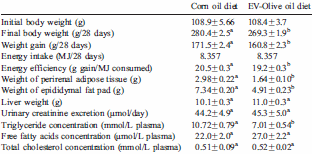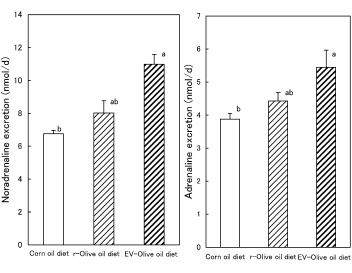Olive Oil helps increase Testosterone, Adrenalin
Posted: Tue Jan 03, 2012 10:10 pm
Here are 2 studies from Ergo-Log.com on Olive Oil, which some consider the "King of Fats", and apparently for good reason:
Olive oil converts cholesterol more easily into testosterone
The more fat you eat, the more testosterone your body produces. More fat, more testosterone. The best source of testosterone boosting fat, Argentinean researchers concluded a year ago after a study on rats, is olive oil. The same researchers have now published the results of another animal study in Lipids,
which shows how olive oil increases the production of testosterone. Olive oil helps the testes to absorb more cholesterol.
The researchers, working at the Instituto de Investigaciones Bioquimicas de La Plata, did an experiment with male rats. For sixty days, the rats were given feed to which seventy grams of soya oil [S], olive oil [O], coconut oil [C] or grapeseed oil [G] per kilogram had been added. At the end of the period the researchers measured how much testosterone the animals were producing. The figure below shows that coconut oil and olive oil were the best testosterone boosters.

The testes of the rats that had had olive oil added to their feed were also heavier. Because the grapeseed oil diet produced the same results as the soya oil diet, we have left that column out of the table below.

The Argentineans described how this happens a year ago. Olive oil and coconut oil increase the activity of the 3beta-HSD and 17beta-HSD enzymes. These are involved in the manufacture of testosterone. Olive oil and coconut oil also raise the concentration of the body’s own antioxidants in the Leydig cells, which produce testosterone. In the present study, the researchers went a step further. They found a relationship between the diet, the amount of free cholesterol in the Leydig cells and the testosterone level.

The Leydig cells make testosterone from cholesterol. A diet that is rich in coconut oil or olive oil apparently helps the cells to absorb more cholesterol. The cells are also more able to extract the cholesterol from its ester. The more free cholesterol a Leydig cell has available, and the less estered cholesterol there is in a cell, the higher the rate of testosterone production.

So natural athletes could optimise their testosterone production by making olive oil their main form of fat. Another nutritional strategy that might help is to eat cranberries. Cranberries increase the uptake of cholesterol by the testes.
More adrenalin through olive oil
A diet in which virgin olive oil is the main source of fat is not only healthy because of the beneficial fatty acids that olive oil contains. In a Japanese animal study, the phenols in olive oil raise the metabolic rate because they increase the concentration of adrenalin and noradrenalin, both stimulatory hormones. This may mean that it’s easier to maintain your weight if you get more of your dietary fat from olive oil.
If you give test animals olive oil they will spontaneously burn more energy than animals given fat from meat or maize. Olive oil increases the production of UCPs – proteins that activate an alternative energy cycle in the mitochondria. As a result more energy is released in the form of heat and less energy is stored as ATP. You could say olive oil is a homeopathic version of DNP.
Olive oil contains about thirty phenols. So does the metabolic effect of olive oil have something to do with this? To find out more the Japanese did an experiment with rats. They were given a high fat diet for four weeks, in which thirty percent of the energy was derived from fats. One group was given maize oil, another olive oil with few phenols, and another group got virgin olive oil containing lots of phenols.
The table below shows the effects of the four-week diet. We’ve omitted the data for the rats that got few phenols: the effects measured for this group were in between those for the maize oil and virgin olive oil group.

The rats that had been fed olive oil had noticeably less fat reserves. And the manufacture of the UCP-1 protein in the brown fat cells was higher in the olive-oil rats. These rats also had increased concentrations of adrenalin and noradrenalin, as the figures below show.

The researchers extracted phenols from the olive oil and then injected the rats with them. Once again the concentrations of adrenalin and noradrenalin rose. For the Japanese this is conclusive evidence that phenols are responsible for the metabolic effect. If they can now work out which phenol is doing the work, they may well have discovered a new component for functional foods or slimming supplements. [/img]
Olive oil converts cholesterol more easily into testosterone
The more fat you eat, the more testosterone your body produces. More fat, more testosterone. The best source of testosterone boosting fat, Argentinean researchers concluded a year ago after a study on rats, is olive oil. The same researchers have now published the results of another animal study in Lipids,
which shows how olive oil increases the production of testosterone. Olive oil helps the testes to absorb more cholesterol.
The researchers, working at the Instituto de Investigaciones Bioquimicas de La Plata, did an experiment with male rats. For sixty days, the rats were given feed to which seventy grams of soya oil [S], olive oil [O], coconut oil [C] or grapeseed oil [G] per kilogram had been added. At the end of the period the researchers measured how much testosterone the animals were producing. The figure below shows that coconut oil and olive oil were the best testosterone boosters.

The testes of the rats that had had olive oil added to their feed were also heavier. Because the grapeseed oil diet produced the same results as the soya oil diet, we have left that column out of the table below.

The Argentineans described how this happens a year ago. Olive oil and coconut oil increase the activity of the 3beta-HSD and 17beta-HSD enzymes. These are involved in the manufacture of testosterone. Olive oil and coconut oil also raise the concentration of the body’s own antioxidants in the Leydig cells, which produce testosterone. In the present study, the researchers went a step further. They found a relationship between the diet, the amount of free cholesterol in the Leydig cells and the testosterone level.

The Leydig cells make testosterone from cholesterol. A diet that is rich in coconut oil or olive oil apparently helps the cells to absorb more cholesterol. The cells are also more able to extract the cholesterol from its ester. The more free cholesterol a Leydig cell has available, and the less estered cholesterol there is in a cell, the higher the rate of testosterone production.

So natural athletes could optimise their testosterone production by making olive oil their main form of fat. Another nutritional strategy that might help is to eat cranberries. Cranberries increase the uptake of cholesterol by the testes.
More adrenalin through olive oil
A diet in which virgin olive oil is the main source of fat is not only healthy because of the beneficial fatty acids that olive oil contains. In a Japanese animal study, the phenols in olive oil raise the metabolic rate because they increase the concentration of adrenalin and noradrenalin, both stimulatory hormones. This may mean that it’s easier to maintain your weight if you get more of your dietary fat from olive oil.
If you give test animals olive oil they will spontaneously burn more energy than animals given fat from meat or maize. Olive oil increases the production of UCPs – proteins that activate an alternative energy cycle in the mitochondria. As a result more energy is released in the form of heat and less energy is stored as ATP. You could say olive oil is a homeopathic version of DNP.
Olive oil contains about thirty phenols. So does the metabolic effect of olive oil have something to do with this? To find out more the Japanese did an experiment with rats. They were given a high fat diet for four weeks, in which thirty percent of the energy was derived from fats. One group was given maize oil, another olive oil with few phenols, and another group got virgin olive oil containing lots of phenols.
The table below shows the effects of the four-week diet. We’ve omitted the data for the rats that got few phenols: the effects measured for this group were in between those for the maize oil and virgin olive oil group.

The rats that had been fed olive oil had noticeably less fat reserves. And the manufacture of the UCP-1 protein in the brown fat cells was higher in the olive-oil rats. These rats also had increased concentrations of adrenalin and noradrenalin, as the figures below show.

The researchers extracted phenols from the olive oil and then injected the rats with them. Once again the concentrations of adrenalin and noradrenalin rose. For the Japanese this is conclusive evidence that phenols are responsible for the metabolic effect. If they can now work out which phenol is doing the work, they may well have discovered a new component for functional foods or slimming supplements. [/img]